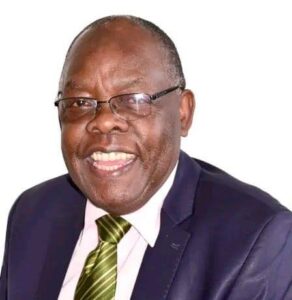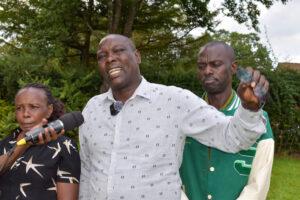Uasin Gishu Women Hold Just 10% of Leadership Roles as Gender Policy is Unveiled

Uasin Gishu Civil Society Chair Benedine Kipruto (in black)hands over the Gender and Community Development Policy to County Executive Lucy Nge’ondo and Assembly Gender Committee Chair Patrick Kimeli. — By Hubzmedia
By James Gitaka, Uasin Gishu
Uasin Gishu County has taken a decisive step toward addressing persistent gender disparities after the Civil Society Network, in partnership with several local organizations, officially handed over a comprehensive Gender and Community Development Policy to the County Executive and Assembly leaders.
The policy, developed through broad-based consultations with civil society actors including Reprodrive, AWDF, Kato Rights Organization, and the Uasin Gishu County Civil Society Network, was presented to Lucy Nge’ondo, the County Executive Committee Member for Youth, Sports, and Gender, and later to Patrick Kimeli, Chairperson of the County Assembly Gender Committee.
Speaking during the handover, Benedine Kipruto, Chair of the Uasin Gishu Civil Society Network, described the policy as “a historic milestone in closing the gender gap in the county.”
“For years, women in Uasin Gishu have been underrepresented in leadership, vulnerable in the informal sector, and at risk from rising cases of gender-based violence. This policy provides a roadmap for inclusive development, accountability, and justice,” Kipruto said.
Stark Gender Gaps in Uasin Gishu
In Uasin Gishu, women hold less than 10 percent of senior leadership roles across both county government and the private sector, compared to the national average of about 22 percent. Land ownership is similarly skewed, with only 18 percent of registered land titles belonging to women, falling below the national average of 26 percent. This imbalance continues to lock women out of asset-based wealth creation and economic independence.
Employment data shows that women make up just 34 percent of the county’s formal workforce, with the majority concentrated in low-paying and insecure jobs. Nationally, women’s participation in formal employment stands at roughly 40 percent, underscoring Uasin Gishu’s lag in promoting gender parity in the workplace.
The health sector highlights further gaps, as only 59 percent of births in Uasin Gishu are attended by skilled personnel, lower than Kenya’s national average of 62 percent. This shortage of skilled birth attendance contributes to preventable maternal and infant deaths that continue to burden the county.
Gender-based violence is another urgent concern. In 2023 alone, Uasin Gishu recorded 1,280 reported cases, a figure that mirrors the national crisis but is widely believed to be an underrepresentation due to stigma and underreporting.
Women’s dominance in the informal economy is also a double-edged sword. While a majority engage in small-scale trade and agriculture, more than 65 percent operate without social protection, legal safeguards, or access to affordable credit, leaving them highly vulnerable to economic shocks. On top of this, a digital divide persists, with women in Uasin Gishu facing a 35 percent gap in access to digital tools and platforms, compared to the national gap of about 25 percent. This digital exclusion prevents them from fully tapping into opportunities in e-commerce, online education, and technology-driven jobs.

Policy Priorities
The Gender Policy introduces five strategic pillars:
-
Ending Violence Against Women and Girls (EVAWG) – Establishing coordinated response frameworks, safe houses, and survivor-centered justice systems.
-
Gender-Just Leadership – Increasing women’s representation in governance through quotas, mentorship, and leadership training.
-
Socio-Economic Empowerment – Expanding women’s access to land, credit, and procurement opportunities.
-
Male Engagement – Promoting inclusive gender awareness programs targeting men and boys.
-
Peace and Security – Embedding gender-sensitive strategies in conflict resolution, peacebuilding, and disaster response.
According to Lucy Nge’ondo, the County Executive, the timing is crucial as Uasin Gishu prepares for the 2025/2026 budget cycle.
“This policy ensures gender issues are no longer treated as side concerns but integrated into planning, budgeting, and service delivery. It is a timely framework for a county that has lacked structured coordination for years,” she said.
Voices Behind the Policy
Outgoing Director of Gender and Social Protection, Joywin Sang, who worked closely with civil society actors in drafting the policy, emphasized its community-centered approach:

“This document reflects the voices of women, men, youth, and vulnerable groups across Uasin Gishu. It is not just a policy written in offices—it is built from lived experiences. My hope is that the county will fully implement it so that it does not gather dust but transforms lives,” Sang said.
Chief Officer in the Department of Gender and Social Protection, Marion Birgen, praised the collaboration that went into the process:
“The formulation of this policy shows what can be achieved when government and civil society work hand in hand. The next critical phase is ensuring it is funded, monitored, and reviewed periodically to keep pace with emerging challenges,” Birgen stated.
The incoming Director of Gender and Social Protection promised to sustain momentum:
“Our commitment is to move from policy to practice. We will work to ensure full implementation of this framework, which is tailored to address the unique challenges facing women and marginalized groups in Uasin Gishu,” the new director assured.
Learning From Other Counties
The Uasin Gishu framework draws lessons from Makueni and Kisumu counties, which are among the few devolved units in Kenya that have already enacted gender policies.
According to a 2023 Council of Governors (CoG) report:
-
Makueni’s policy has increased women’s access to county development funds and strengthened GBV response systems.
-
Kisumu’s approach has expanded women’s participation in public procurement and improved coordination between county and national gender institutions.
“We are not starting from scratch. Other counties have shown that gender policies can work if they are funded and implemented with political will. Uasin Gishu now has the opportunity to join this progressive league,” noted Kipruto.
Civil society leaders have urged the county leadership to fast-track endorsement and ensure adequate budgetary allocation to operationalize the policy.
Patrick Kimeli, Chair of the County Assembly Gender Committee, assured stakeholders of the assembly’s commitment:

“The assembly will ensure this document is not shelved. Our responsibility is to transform it into law and monitor its implementation so that women, men, youth, and vulnerable groups benefit equally,” Kimeli said.
As Uasin Gishu positions itself to become a model county in inclusive governance, the success of the Gender and Community Development Policy will depend on financing, political commitment, and sustained community participation.





